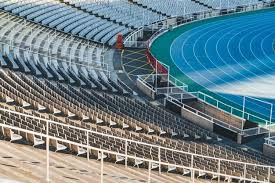Japan Losing Race to Host Memorable Olympics
- leensteve
- Jul 12, 2021
- 2 min read
Updated: Dec 27, 2021

Remember the 2020 Olympics?
No, you don’t, because they never happened due to something called COVID-19.
The worldwide pandemic was in full murderous swing last Summer, and organizers decided to do the next best thing: Hold them in 2021.
Well, 2021 is here and so are -- almost -- the postponed 2020 Olympics, scheduled to begin July 23.
It was bad enough to make thousands of the world’s best athletes wait another 12 months to chase their dreams of Olympic glory. When you’re young and laser-focused on winning an Olympic event, it’s a bitter pill to swallow to have to maintain that dedication not knowing if the pandemic would loosen its grip by Summer 2021.
But thanks to amazing work by scientists at Moderna, Pfizer, AstraZeneca and some other vaccine-making companies, COVID HAS loosened its grip on the United States and many other technologically-developed nations.
But not Japan.
With hundreds of millions of dollars spent on hosting the games for tens of thousands of athletes and a huge economic boost at stake, Japan has floundered Big Time.
Only a small percentage of Japan's population has received a vaccination, with the Olympics less than two weeks away.
At first, Japanese leaders said -- in response to the ongoing COVID threat on the island nation -- only masked Japanese citizens would be allowed to attend the games.
But today I read that the Japanese government has decided not to allow ANY spectators at the world’s-best spectator event!
It’s hard to imagine having to compete in those conditions. The incredible heart-pounding events are absolutely meant for deliriously cheering crowds urging on their nation's athletes.
It reminds me of the baseball and football games held in the U.S. last year in empty stadiums. To overcome the creepiness of a game being played in a silent stadium, Americans did a very-American thing: They added taped crowd noise to the broadcast to make it seem more “real.”
(Although I heard that the players couldn’t hear the taped cheering and went about their business on the field in weird silence).
Why did Japan blow this rare opportunity to showcase its culture and receive a major monetary infusion?
Many reasons, according to some observers. Japan didn’t start vaccinating until months after the U.S. and other nations. They had no home-grown vaccine, and waiting for one was part of the delay.
And there was a cultural obstacle: Japan only allows doctors and nurses to give the shots and could not utilize volunteers and others to administer them out of safety concerns.
So, in large part, the Japanese Olympic Fiasco was self-inflicted. And it didn’t help that -- just when organizers thought the worst was behind them -- new COVID variants began showing up, resulting in the no-spectators ban.
I’ve always enjoyed watching at least some of the Summer Olympics when they returned every four years.
But this year -- without spectators and the excitement they bring to the events -- I’m not so sure.
I wonder what’s on Netflix this month?




Comments